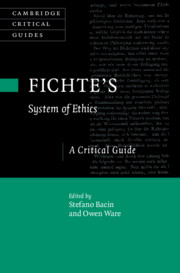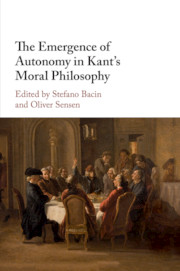25 results
Copyright page
-
- Book:
- Fichte's System of Ethics
- Published online:
- 20 May 2021
- Print publication:
- 20 May 2021, pp iv-iv
-
- Chapter
- Export citation
Contents
-
- Book:
- Fichte's System of Ethics
- Published online:
- 20 May 2021
- Print publication:
- 20 May 2021, pp v-vi
-
- Chapter
- Export citation
Introduction
-
-
- Book:
- Fichte's System of Ethics
- Published online:
- 20 May 2021
- Print publication:
- 20 May 2021, pp 1-9
-
- Chapter
- Export citation
Chapter 10 - My Duties and the Morality of Others
-
-
- Book:
- Fichte's System of Ethics
- Published online:
- 20 May 2021
- Print publication:
- 20 May 2021, pp 201-220
-
- Chapter
- Export citation
Acknowledgments
-
- Book:
- Fichte's System of Ethics
- Published online:
- 20 May 2021
- Print publication:
- 20 May 2021, pp ix-ix
-
- Chapter
- Export citation

Fichte's System of Ethics
- A Critical Guide
-
- Published online:
- 20 May 2021
- Print publication:
- 20 May 2021
Bibliography
-
- Book:
- Fichte's System of Ethics
- Published online:
- 20 May 2021
- Print publication:
- 20 May 2021, pp 221-228
-
- Chapter
- Export citation
Abbreviations and Translations
-
- Book:
- Fichte's System of Ethics
- Published online:
- 20 May 2021
- Print publication:
- 20 May 2021, pp x-xii
-
- Chapter
- Export citation
Contributors
-
- Book:
- Fichte's System of Ethics
- Published online:
- 20 May 2021
- Print publication:
- 20 May 2021, pp vii-viii
-
- Chapter
- Export citation
Index
-
- Book:
- Fichte's System of Ethics
- Published online:
- 20 May 2021
- Print publication:
- 20 May 2021, pp 229-232
-
- Chapter
- Export citation
Index
-
- Book:
- The Emergence of Autonomy in Kant's Moral Philosophy
- Published online:
- 05 October 2018
- Print publication:
- 25 October 2018, pp 224-226
-
- Chapter
- Export citation
Contents
-
- Book:
- The Emergence of Autonomy in Kant's Moral Philosophy
- Published online:
- 05 October 2018
- Print publication:
- 25 October 2018, pp v-vi
-
- Chapter
- Export citation
Abbreviations and Translations
-
- Book:
- The Emergence of Autonomy in Kant's Moral Philosophy
- Published online:
- 05 October 2018
- Print publication:
- 25 October 2018, pp ix-xii
-
- Chapter
- Export citation
Contributors
-
- Book:
- The Emergence of Autonomy in Kant's Moral Philosophy
- Published online:
- 05 October 2018
- Print publication:
- 25 October 2018, pp vii-vii
-
- Chapter
- Export citation
Chapter 3 - Autonomy and Moral Rationalism
-
-
- Book:
- The Emergence of Autonomy in Kant's Moral Philosophy
- Published online:
- 05 October 2018
- Print publication:
- 25 October 2018, pp 48-66
-
- Chapter
- Export citation
References
-
- Book:
- The Emergence of Autonomy in Kant's Moral Philosophy
- Published online:
- 05 October 2018
- Print publication:
- 25 October 2018, pp 213-223
-
- Chapter
- Export citation
Acknowledgments
-
- Book:
- The Emergence of Autonomy in Kant's Moral Philosophy
- Published online:
- 05 October 2018
- Print publication:
- 25 October 2018, pp viii-viii
-
- Chapter
- Export citation
Introduction
-
-
- Book:
- The Emergence of Autonomy in Kant's Moral Philosophy
- Published online:
- 05 October 2018
- Print publication:
- 25 October 2018, pp 1-9
-
- Chapter
- Export citation
Copyright page
-
- Book:
- The Emergence of Autonomy in Kant's Moral Philosophy
- Published online:
- 05 October 2018
- Print publication:
- 25 October 2018, pp iv-iv
-
- Chapter
- Export citation

The Emergence of Autonomy in Kant's Moral Philosophy
-
- Published online:
- 05 October 2018
- Print publication:
- 25 October 2018

